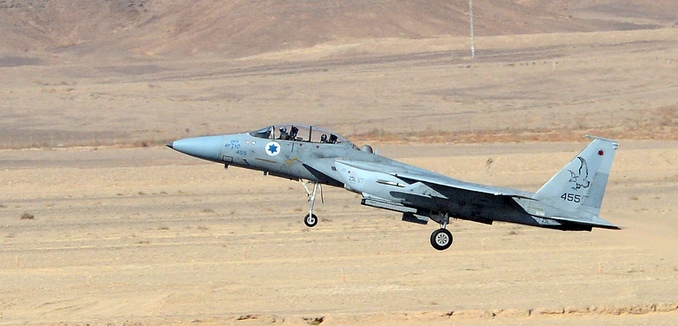A Hezbollah arms convoy and a Syrian military target were hit overnight by Israeli air strikes, Arab media reported Wednesday.
Syrian government-associated news sources reported that there were four explosions in Damascus at 1:15 in the morning, as a military compound near the Damascus airport was hit by Israel Air Force planes operating in Lebanese airspace. The Kuwaiti news network al-Rai reported that the planes also struck several vehicles travelling along the Beirut-Damascus highway, which were apparently part of a Hezbollah arms convoy.
The Israeli government has stated that it will not allow Hezbollah to obtain “game-changing” weapons, such as anti-aircraft systems or chemical weapons. Though Israel has not generally acknowledged striking targets inside Syria since that country’s civil war began in 2011, Israeli Prime Minister Benjamin Netanyahu indicated earlier this year that Israel had carried out numerous strikes in Syria aimed at preventing Hezbollah from obtaining advanced armaments.
Thousands of Hezbollah fighters are fighting in Syria at the behest of Iran, which supports both the terror group and the Bashar al-Assad regime. In addition to gaining combat experience, Hezbollah has also been building its arms capabilities in order to strengthen their hand in an eventual war with Israel.
Israeli officials believe that any future war with Hezbollah has the potential to cause “thousands of civilian deaths” in Israel. Hezbollah has, among other things, threatened to attack ammonium tanks in Haifa, which could kill tens of thousands of people.
Jonathan Schanzer, the vice president for research at the Foundation for Defense of Democracies, explained in July that Hezbollah’s widely-reported tactic of hiding military assets in civilian areas would also lead to mass casualties in Lebanon. Reports emerged two years ago that Hezbollah was offering reduced-price housing to Shi’ite families who allowed the terrorist group to store rocket launchers in their homes. An Israeli defense official told The New York Times in May 2015 that the buildup of Hezbollah’s terror infrastructure in southern Lebanese villages meant that “civilians are living in a military compound” and that their lives were at risk. A few days later, a newspaper linked to Hezbollah bolstered the Israeli assessment.
Secretary of State John Kerry made assurances last year that the U.S. would ensure that Iran could not continue to arm Hezbollah after lifting nuclear-related sanctions against Tehran. “Our primary embargo is still in place,” Kerry said at a Senate hearing. “We are still sanctioning them. And, I might add, for those things that we may want to deal with because of their behavior, for instance, Hezbollah, there is a UN resolution, 1701, the prevents the transfer of any weapons to Hezbollah. That will continue and what we need to do is make sure that we’re enforcing it.”
While UN Security Council Resolution 1701, which was passed unanimously to end the 2006 war, forbids the arming of Hezbollah, Iran has continued to send the terrorist group weapons and the Security Council has refused to enforce it.
[Photo: U.S. Embassy Tel Aviv / Flickr ]




